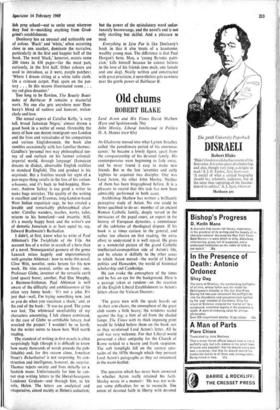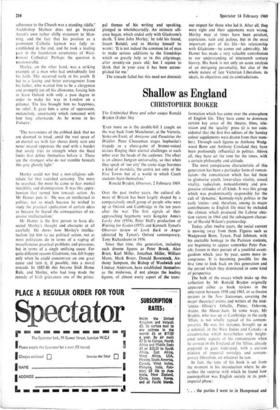Old chums
ROBERT BLAKE
Lord Acton and His Times David Mathew (Eyre and Spottiswoode 70s) John Morley, Liberal Intellectual in Politics D. A. Hamer (our 65s) As Gladstone moved into what Lytton Strachey called 'the penultimate period of his enormous career,' he became a lonely figure, apart from the companionship of his devoted family. His contemporaries were beginning to fade away, and he never found it easy to make new friends. But in the late 'seventies and ea'ily 'eighties he acquired two disciples. One was Lord Acton, the other John Morley. Neither of them has been biographised before. It is a pleasure to record that this task has now been admirably performed in both cases.
Archbishop Mathew has written a brilliantly perceptive study of Acton. No one could be better qualified to do so: member of an ancient Roman Catholic family, deeply versed in the intricacies of the papal court, an expert in the history of European dynasties, a connoisseur of the subtleties of theological dispute. •!f his book is at times caviare to the general, and rather too allusive on first reading, the extra effort to understand it is well repaid. He gives us a wonderful picture of the grand Catholic intellectual-cosmopolitan side of Acton's life, and he relates- it skilfully to the other areas in which Acton moved—the world of Liberal politics and Hawarden, the world of historical scholarship and Cambridge.
He can evoke the• atmosphere of the times and he has an eye for the background. Here is a passage taken at random—on the reaction of the English Liberal Establishment to Acton's letters about the Vatican Decrees:
'The grave men with the spade beards sat in their arm chairs; the atmosphere of the great club rooms a little heavy; the windows sealed against the fog; a hint of oil from the shaded lamps. The Times with its thick imposing print would lie folded before them on the book rest as they scrutinised Lord Acton's letter. All he said was very welcome. For that Liberal world possessed a clear antipathy for the Church of Rome welded to a hearty and frank suspicion. The soft lamplight fell on the austere spec- tacles of the 1870s through which they perused Lord Acton's paragraphs as they sat ensconced in the warm leather.-
The question which has never been answered is whether Acton really retained his faith. Morley wrote in a memoir: 'He was not with- out some difficulties for us to reconcile. The union of devoted faith in liberty with devoted adherence to the Church was a standing riddle.' Archbishop Mathew does not go beyond Acton's own rather chilly statement to Man- ning, and the fact that his position as a prominent Catholic layman was fully re- established in the end, and he took a leading part in the foundation ceremonies of West- minster Cathedral. Perhaps the question is unanswerable.
Morley, on the other hand, was a striking example of a man who had undoubtedly lost his faith. This occurred early in his youth. It led to a lasting and bitter estrangement from his father, who wanted him to be a clergyman and promptly cut off his allowance, forcing him to leave Oxford with only a pass degree in order to make his way in London on a pittance. The loss brought him no happiness, no relief. It gave him a- sense of oppression, melancholy, uncertainty which remained with him long afterwards. As he wrote in his Voltaire: `The narrowness of the cribbed deck that we are doomed to tread, amid the vast space of an eternal sea with fair shores dimly seen and never neared oppresses the soul with a burden that sorely tries its strength when the fixed limits first define themselves before it. Those are the strongest who do not tremble beneath this grey ghostly light.'
Morley could not find a non-religious sub- stitute for that vanished certainty. The more he searched, the more he came to fear mental instability and disintegration. It was this appre- hension that turned him towards action. As Mr Hamer puts it : 'He was an intellectual in politics, not so much because he wished to study the practical application of certain ideas as because he feared the consequences of ex- cessive intellectualism.'
Mr Hamer is the first person to have dis- sected Morley's thought and character at all carefully. He shows how Morley's intellec- tualism led him to see political action, not as most politicians do in terms of a ragbag of miscellaneous practical problems and pressures, but in terms of a single unifying cause. For quite different reasons Gladstone, too, felt happy only when he could concentrate on one great cause and turn it, if possible, into a moral crusade. In 1885-86 this became Irish Home Rule, and Morley, who had long made the remedy of Irish grievances one of the princi-
pal themes of his writing and speaking, plunged in wholeheartedly. An intimate alli- ance began, which ended only with Gladstone's death. `I love John Morley,' he told his friend, Stuart Rendel, and to Morley himself he wrote: `It is not indeed the common lot of man to make serious additions to the friendships which so greatly help us in this pilgrimage, after seventy-six years old; but I rejoice to think that in your case it has been accom- plished for me.'
The crusade failed but this need not diminish our respect for those who led it. After all, they were right and their opponents were wrong. Morley may at times have been petulant, capricious, vain and jealous, but in the most important part of his life—his relationship with Gladstone—he comes out admirably. Mr Hamer has made a very valuable contribution to our understanding of nineteenth century history. His book is not only an acute analysis of an intriguing personality, but also of the whole nature of late Victorian Liberalism, its ideals, its objectives and its contradictions.



































 Previous page
Previous page